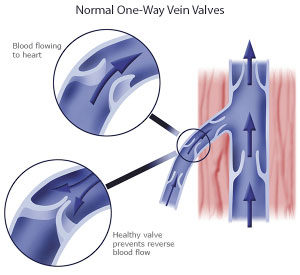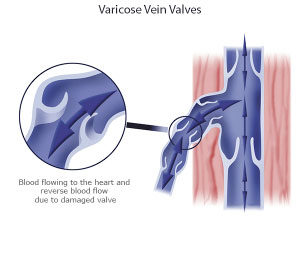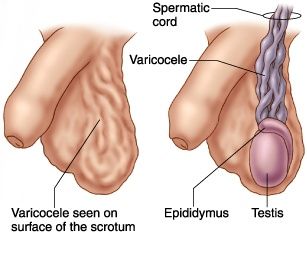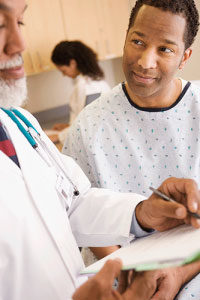
If you have recently met with your physician and have been diagnosed with a varicocele, you may have some questions, starting with “What is a varicocele”? Varicoceles are varicose veins that occur in the veins in your scrotum – the pouch of skin that holds your testicles in place. For up to 85% of men, varicoceles usually develop on the left side. i Typically they develop over time, as the group of connected veins in your scrotum become enlarged when blood pools in the area due to incompetent or failed valves within these veins.


How Do I Know If I Have a Varicocele?
Many men don’t even know they have a varicocele, as they are often asymptomatic. But in truth, varicoceles are actually pretty common. About 10 – 15% of all males have a varicocele.i
Varicocele Symptoms
 While it is true that many men don’t ever have any symptoms at all, there are actually many common symptoms of varicoceles that you may be experiencing. Some varicocele symptoms can include:
While it is true that many men don’t ever have any symptoms at all, there are actually many common symptoms of varicoceles that you may be experiencing. Some varicocele symptoms can include:
- Enlarged, twisted veins in your scrotum that look and feel like a bag of worms
- A heavy, uncomfortable or dull aching feeling in your scrotum
- A lump in your testicle that doesn’t hurt
- One testicle that’s bigger or heavier than the other
- Pain that worsens when you’re standing but is relieved when you lie down
- Low sperm count
- Pain that’s worse after strenuous exercise
- Pain that is worse in hot weather i
Can Varicoceles Be Harmful?
Most times, varicoceles are harmless. However, they can contribute to male infertility.ii
Usually, a varicocele is easy to diagnose, and chances are if you have one, your doctor will find it during a routine physical exam. Sometimes, doctors use specialized ultrasound called color Doppler ultrasonography (CDUS) to precisely diagnosis varicoceles. iii Varicoceles often don’t need treatment, but if yours is bothersome, or if you and your partner are having trouble getting pregnant and your doctor thinks it may be due to your varicocele, you have options. You can have varicocele surgery or a minimally invasive alternative to surgery, known as varicocele embolization, to repair it. iv
Learn more: Is a Varicocele Diagnosis Serious?
Who Gets Varicoceles?
Varicoceles often form during puberty. About 15 out of every 100 males will develop a varicocele.iv And it doesn’t matter what race you are, where you live or what other medical issues you have, your chance of developing a varicocele is the same.
However, there’s some research that suggests that being obese might actually reduce your risk of developing a varicocele. Still, there are lots of health issues linked to being overweight, so maintaining a healthy weight is still a good idea. Also, a study published in 2012 found that taller men may be more likely to develop a varicocele, at least on their left side.v, vi
What Causes a Varicocele?
While scientists aren’t exactly sure what causes varicoceles to develop, they’ve discovered some potential explanations.
The veins in your scrotum have one-way valves. These one-way valves allow blood to flow from your testicles and scrotum to your heart and, when functioning properly, they prevent it from pooling in your scrotal veins.
If the valves don’t work as well as they should, blood can then pool in the veins of your scrotum, causing them to grow larger, or dilate, ultimately forming a varicocele.
It is thought that varicoceles are often on the left side due to the position of the veins on that side of the scrotum.iii The anatomy of the left side of your scrotum is different than the right side. The spermatic vein on the right has a more direct path, which allows blood to flow more freely .ii [/accordion]
What Should I Do If I Think I Have a Varicocele?
 If you have been diagnosed with a varicocele and are considering treatment options, do your research. There are surgical treatment options as well as safe and effective, minimally invasive options that can be done in an outpatient setting by an interventional radiologist.
If you have been diagnosed with a varicocele and are considering treatment options, do your research. There are surgical treatment options as well as safe and effective, minimally invasive options that can be done in an outpatient setting by an interventional radiologist.
If you have not yet been diagnosed and think you are experiencing symptoms of having a varicocele, don’t be embarrassed to talk to your doctor. Varicoceles are common, and your doctor sees them often. Any lump or abnormality in your groin area should be checked, so don’t wait.
Your doctor will examine your groin area for lumps and swelling and to evaluate tenderness in this area. The doctor might also order an ultrasound exam. By measuring the blood flow through your scrotum, an ultrasound can usually determine if you have a varicocele.
Let’s review. Exactly what is a varicocele? Varicoceles are enlarged veins that develop over time in your scrotum. Varicocele side effects are usually harmless, as varicoceles often don’t cause any symptoms. But if your varicocele is causing symptoms, you should know that you have options. Varicoceles can be corrected with surgery or through an effective and minimally invasive, outpatient procedure known as varicocele embolization. Consider all options before deciding on surgery. To learn more, speak with a varicocele embolization specialist today.
Sources:
i UCLA Health (2017) Varicocele Symptoms. http://urology.ucla.edu/body.cfm?id=478&action=detail&ref=19
ii Urology Care Foundation (2017). What is a varicocele? http://www.urologyhealth.org/urologic-conditions/varicoceles
iii Cimador, M, Di Pace, M., Peritore, M., Sergio, M., Castagnetti, M., De Grazia, E. “The role of Doppler ultrasonography in determining the proper surgical approach to the management of varicocele in children and adolescents.” (2006). BJU Int. 97(6):p. 1291-1297.
iv Mayo Clinic (2017). Varicoceles. http://www.mayoclinic.org/diseases-conditions/varicocele/basics/definition/con-20024164
v Science Alert (2011). Effect of Body Mass Index on Severity and Prevalence of Varicocele http://scialert.net/fulltext/?doi=pjbs.2011.869.875&org=11
vi Gokece, A., Demirtas, A., Ozturk, A., Sahin, N., Ekmekcioglu, O. “Association of left varicocele with height, body mass index and sperm counts in infertile men.” (2013). Andrology. 1(1):p. 116-119.


